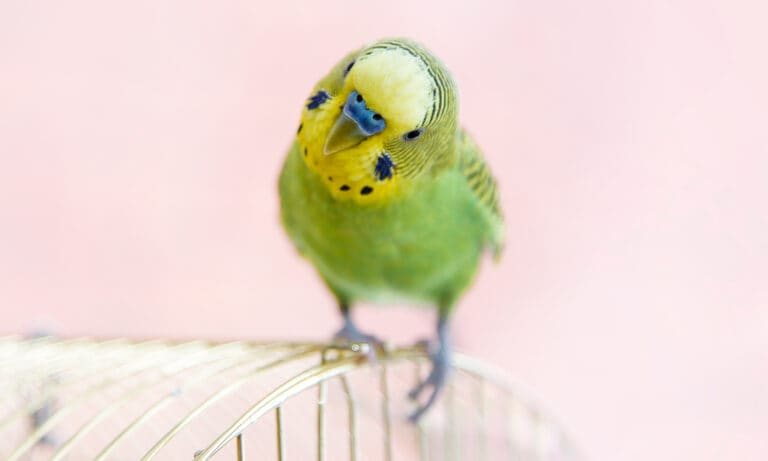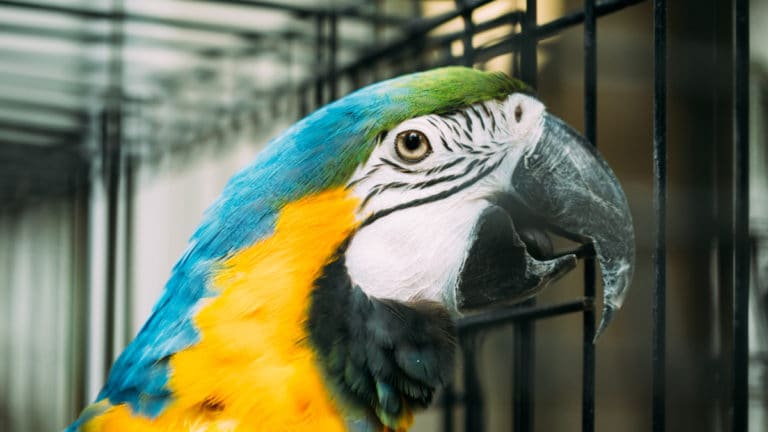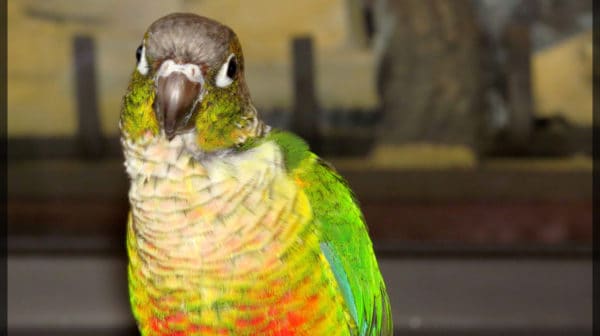When a bird works to assist in therapy or offer comfort or emotional support to an individual with a disability under the care of a trained medical professional, the bird is working as an “emotional support animal,” an “assistance animal,”or a “therapy animal.” Different legal rules apply to service animals, emotional support animals and pets.
Parrots and some other species of birds are known to be extremely empathetic and tuned into the emotional environment around them. They can sense stress and tension, anger and distress in their owners, before these bubbling feelings break the surface. Such sensitivity can be harnessed and birds, like other species, can be trained to use these abilities to help individuals with psychological or emotional disabilities.
In one famous case, a bi-polar man relied on his empathetic African grey parrot to intuit when a rage-like episode was coming on and encourage him to “calm down!” He carried her in a cage fitted with straps like a backpack so she could travel with him anywhere. She was trained to repeat soothing phrases and sounds to talk him down.
Abused and injured parrots, harbored in refuges, exhibit uncertainty and mistrust of humans similar to the feelings of veterans experiencing post traumatic stress disorder. A number of unique programs run out of charitable aviaries draw on these shared experiences and emotions to help veterans and injured birds heal one another. Also, as handling birds demands focus and gentleness and interacting with them can bring about a sense of peace, many species of birds, from macaws to cockatiels, are used in therapy, prison rehabilitation programs, and in nursing homes.
Gifted Wings Ministry: Birds Helping People
Gifted Wings Ministry, a Tulsa, Oklahoma non-profit organization that facilitates visits and educational presentations with rescued birds was co-founded in 2000 by Joyce Legere and Maureen Horton-Legere. Understanding the beneficial effects of interacting with birds they began On a Wing & A Prayer, a program that brings birds into many different community facilities, including nursing homes.
“In a nursing facility, one day runs into the next,” Horton-Legere explained. “Sometimes, there isn’t a lot to look forward to. You go to the common area for mealtime or you go to your therapy, every day is the same. But every time they posted the announcement for our program, it brought so much hope and excitement. Word would get around that ‘The birds are coming!’ and with every visit there were more people.”
The therapeutic effects of the program were long lasting. “We’d bring the birds up close so that the people who had limited vision could see and touch and hear,” Horton-Legere said.”It would activate all the senses: sight, sound, smell. We would hear from the Activities Directors that the residents would still be talking about the visits long after we were gone.”
Horton-Legere recalled one woman with dementia who yelled and cried through the presentation, but when it was her turn to hold a bird, she calmly explained that her children had had a bird growing up. They were her first lucid words in years. Another woman, who did not speak, feed herself or clean herself, began to speak again in order to argue that she should be allowed to keep the bird she was holding. Seeing an opportunity to engage the woman in conversation, her caretaker was able to leverage her emotional connection with the bird into a willingness to once again connect with others and participate in her own care.
Gifted Wings and other organizations offer their rescued birds to facilities, and also for adoption by individuals with mental, emotional, or developmental conditions who will benefit from an emotional support relationship with a bird.However, individuals that adopt a bird as an emotional support animal should be aware of their rights and restrictions.
Know Your Rights
Trained birds that assisted individuals with disabilities used to be categorized as service animals under the Americans with Disabilities Act (ADA). This meant that they could go where their owners went: on planes, in buses, in hospitals and grocery stores. They could even come to work with their owners, or live in apartments with “no pets” policies because service animals are not considered “pets.” However, in 2011, “service animal” was re-defined under the ADA to include only “dogs that are individually trained to do work or perform tasks for people with disabilities,” and also some specially trained miniature horses.
Once the definitional change went into effect, facilities governed by the ADA could ask other types of service animals to leave. Places of public accommodation governed by the ADA, such as hotels, do not have to accept any animal except ADA-defined service animals. Even a parrot prescribed by a doctor to assist in treatment for a particular psychological disability can be refused. However, there are many instances where therapy birds may still be permitted.State and local regulations may provide additional protections for the rights of persons with disabilities to be accompanied by their therapy animals, including birds.Birds working as emotional support animals may be permitted into their owners’ workplaces or “no pets” apartments.
The change that restricted the definition of service animals under the ADA to dogs did not alter Title I, which addresses service animals in the workplace. Employers must provide “reasonable accommodations” to ensure equal opportunities in the workplace. Such reasonable accommodations could include a screen reader, an ergonomic keyboard or a reserved parking lot near the entrance. Therefore, if a worker requests that her trained assistance bird accompany her to work, her employer must consider this request and determine if it would qualify as a reasonable accommodation.
Under the same logic, the Fair Housing Act (FHA) requires landlords to provide individuals with disabilities reasonable accommodations to afford them equal opportunities enjoy and use a dwelling. Service animals are, of course protected. But other types of “assistance animals,” such as emotional support animals, therapy animals and comfort animals, may also be protected as reasonable accommodations.The key questions for a landlord to consider would be whether the bird in question is merely a pet, or whether it is a trained working animal assisting its owner with a disability, and whether permitting it would be a reasonable accommodation of the owner’s disability.
Generally, in any situation, if your bird assists you with a disability and you need to keep it with you, you should politely but firmly make your needs clear. Get to know your rights so you can stand up for them. Your local state bar can be an excellent resource for referrals to experienced lawyers in your area such as those with experience in housing, employment, and animal rights issues. Some will offer low cost consultations to give you basic legal information.Business owners, employers (and yes, even landlords!) usually do want to follow the law and reasonably accommodate individuals with disabilities. But you may need to do some work to convince them that your assistance bird is a reasonable accommodation!
Posted By: Chewy Editorial
Featured Image: Courtesy of Gifted Wings Ministry in Tulsa, Oklahoma
Share:









